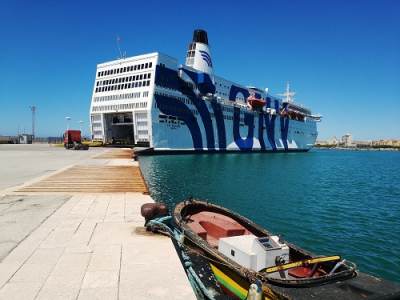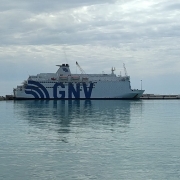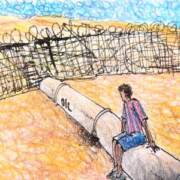Quarantine ships: GNV’s empire of the sea
Article first published on July 27, 2021
Recently it happened to me that I boarded a ship of the GNV company. It is no rarity, you could say, as those ships move passengers from one coast of Italy to the other, especially in the summer. But it turns into a different experience after living several months in Sicily, discovering the whole extent of complicity between the company and the State of Italy, in confining for weeks in the middle of the sea the people who arrive in Italy via the Canal of Sicily.
I have diverse and conflicting feelings while boarding the GNV ship Aries that will take me back to Sicily. I feel anger because I would not like to contribute to the economic activity of those who offer logistical support to illegitimate practices. I feel curious as I think it is important to get an idea of how these ships are working, their spaces, their devices and the technologies which are used. And last but not least, I feel awareness, which contrasts with the ignorant tranquillity of hundreds of people crowding the cabins and the ship bridge of that boat which seems to be comfortable and innocent.
The meeting
„You cannot stay here“. This is how the encounter begins, with a sailor who ask me and another passenger to leave this place, which is the dogs’ area and at the same time the only outdoor area for the crew and the only place where you can find tables in the entire small outdoor area of the ship.
After some jokes, we can convince the sailor to let us stay there, and the passenger next to me comments: „This ship is a bathtub, we are paying to have even not half of the service“.
In a few minutes, we discover the Aries, as well as the Antares – a ship already engaged for the quarantine of migrants in Sicily – was purchased no more than two months ago by the family of shipowners Aponte, who is the owner of GNV as well as of MSC, the biggest cargo and cruises company in the world.
Aries and Antares were purchased by North European companies. These are ships that usually sail in very different seas. Indeed, the sailor complains: „Where I work, there are 50°C. These ships are used to sail through ice-cold waters, hence the motor cools down quickly. But in our warm sea, this does not happen. I have been here for one month and I have lost five kilograms, I will never get them back. Also because, when I finish one shift, the only place outside where I can be, is full of shit and piss of dogs, and inside, in my room, there is only neon light. There is nothing else I can do as to lay down on my bed and watching TV“.
The passenger next to me adds: „No reason to think it would be better for the passengers. This ship is tiny, the space and the services are really few, but the prices are even higher than on some other ships“. The sailor nods and goes away. Becoming curious, I try to ask this passenger some questions about the quarantine ships, but the only thing he can tell me, is, that there is an „insane rotation of money“.
The business
During my walk on the decks of the Aries, a ship with a high technological infrastructure and above all a large fleet of cameras scattered in different corners, I do a quick research on the Internet to find out more about the Aponte family. Indeed, this family’s business is immense: just think that the MSC has become the largest fleet of container transports by sea under the leadership of the Aponte a few days ago.
A colossus of logistics, a sector that has become the backbone of the global economy in the last decade and has led to the progressive “urbanization” of the sea. In 2020, 41% of the containers loaded and unloaded in Italian ports passed through terminals controlled by MSC. Yes, because in addition to owning ships and transporting goods, the company also controls several ports or parts of Italian ports: Gioia Tauro completely, Genoa, Naples, Palermo and Catania in large parts.
With such a large maritime empire, it doesn’t matter that MSC Cruises – the world’s largest private cruise company – lost nearly a billion euros in the Covid year. The “business” of quarantine ships has brought significantly more moderate numbers in this context – in March 2021 they talked about “only” 34 million – but these were fundamental to preserve this piece of empire standing, which would otherwise collapse due to Covid19.
The Italian state and its racially motivated sanitary confinement practices therefore prevented the owner from having to reach for his wallet and even enabled him to think about medium-long term investments such as the purchase of the Aries and the Antares. In fact, as soon as I saw the structure of the ship from the dock of the port, I thought it was a perfect ship for the confinement of people: compact and with very few open spaces. Once on board, due to the cameras and the very few common spaces, that idea was reinforced. In short, it is an excellent move for the Aponte family to increase profits during the tourist season, but why not also offer the ship’s services to the highest bidder, such as the Italian government.
The container as a paradigm, the body as a commodity
Perhaps what impressed me most about this story is that I found an initial empirical answer to a series of questions I had been asking myself for some time. There is a very close connection between the contemporary global economic system – and its main actors like the Aponte family – and the necropolitical government of migration, and the container becomes the material and metaphorical element around which this connection is articulated.
The container ploughs the seas aboard huge cargo ships, “colouring” ports all over the world before the goods inside are sorted. The container is the symbol of a trade based on digitization, control and exploitation of labour that moves in silence and aims to silence the voices that question its economic, social and environmental sustainability.
At the same time, however, the container is the first structure that is used in “emergency situations”: in hotspots, in CPRs, in the institutional camps of workers – as in Cassibile – on the docks of quarantine ships, at intra-European border crossings – as in Ventimiglia – the container is the symbol of the infinite movement through which the bodies of migrants are managed until they are disoriented and become precarious and marginalized bodies that will be exploited precisely in those sectors where the great business of these entrepreneurs is articulated, in ports, in logistics and in all those market niches in which production can only progress if labour costs are low and the workforce can be blackmailed.
Looking at the migrations through the container, one can see that the migrant body is viewed as a commodity that can be controlled and catalogued by sophisticated digital and military systems, which can be rejected or used as a bargaining chip.
Aponte is the emperor of the sea, his ships and containers guide the lives of billions of people, they are the infrastructure of contemporary capitalism. His ships, his containers and “his” capitalism have been deciding the life and death of tens of thousands of people for a year and a half.
We and the people who emigrate oppose all of this.
Emilio Caja
Borderline Sicilia
Translated from Italian by Alexandra Obermüller









